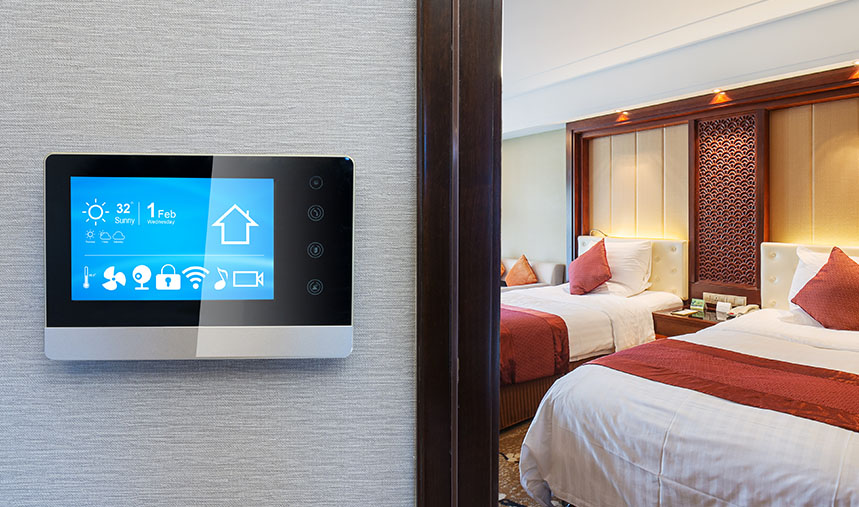Imagine this: You arrive at your favorite hotel after a long journey. Instead of waiting in line, you check in seamlessly through an app. A robotic concierge greets you by name, takes your bags, and escorts you to your room—one that’s already set to your ideal temperature. The lights dim to match your preference, and the movie you’ve been meaning to watch is queued up on the TV, ready to go.
We’re not there yet, but AI is rapidly propelling us towards a time when this scenario will become a reality. As traveler expectations continue to evolve, technology is playing a key role. It’s not just limited to how guests book their stays but extends to every aspect of their hotel experience.
Research states that nearly 80% of travelers, for example, would already be willing to stay at a hotel with a completely automated front desk or self-service kiosk, and more than 40% say they prefer to check in via a hotel’s website, app, or digital kiosk.
And it’s not just about check-in. One-third of travelers have already used AI-powered booking recommendations. During their stay, 43% want in-room smart devices for personalized control, 34% prefer keyless room entry, and 24% are looking for digital ordering options.
With a healthy – and growing – appetite for seamless efficiency at every stage of their journey and stay, it’s clear that the need for digital-first experiences in the hospitality industry has never been greater.
Embracing the Automation Opportunity
The hospitality industry is at an inflection point. Guests are no longer just seeking a comfortable stay; they expect seamless, personalized, and tech-enabled experiences at every touchpoint. For hotel chains, this shift presents a golden opportunity—not just to meet evolving consumer demand, but to fundamentally rethink how they operate, using AI and automation to drive both guest satisfaction and business efficiency.
We’ve already visualized the AI-led, automated check-in experience. Beyond the guest experience, AI is transforming hotel operations behind the scenes. Demand forecasting and automated sales strategies allow hotels to predict occupancy rates more accurately, optimizing pricing and inventory.
Marketing teams can create hyper-personalized campaigns based on behavioral insights, while human resources can leverage AI to analyze staffing needs, ensuring the right people are in place at the right time.
Even revenue management is evolving. AI-powered predictive analytics enable dynamic pricing, helping hotels maximize revenue by adjusting room rates in real time based on demand fluctuations.
The impact of these innovations is undeniable. Hotels that embrace automation not only deliver enhanced guest experiences but also achieve measurable business outcomes—cost savings, increased operational efficiency, and improved revenue streams. It’s no surprise that the hotel automation system market, valued at $5.26 billion in 2024, is projected to reach $8.31 billion by 2031, growing at nearly 8% annually.
Adopting High-Impact Use Cases to Drive Next-Level Value
To capitalize on the potential opportunities, hotels must overcome the challenges they currently face when implementing AI-driven automation. These include high implementation costs, integration complexity between legacy systems and new technologies, and staff training.
Successfully overcoming these challenges will allow hotels to deploy use cases that deliver bottom-line impact. Some of the use cases hotels are reaping value on include:
- The pre-arrival process. AI-driven insights enable hotels to personalize every aspect of a guest’s stay before they even arrive. From tailoring room settings to curating local activity recommendations, AI analyzes extensive guest data to identify patterns in behavior, preferences, and booking habits. This allows hotels and restaurants to offer highly customized experiences with greater precision, enhancing guest satisfaction and engagement.
- Smart operations AI analyzes room occupancy and guest preferences to assign housekeeping tasks efficiently. Hotels can optimize housekeeping stock, while restaurants use AI to monitor food storage and predict ingredient needs, reducing excess waste and improving cost control.
- Guest feedback. AI-assisted models can process and analyze massive amounts of data and recognize patterns, trends, and anomalies, making the technology the perfect solution for monitoring feedback across channels and driving continuous improvements.
- Smart energy management. Hotel chains can invest in harnessing and modernizing automated systems that monitor and adapt energy usage to optimize efficiency through smart thermostats, lighting systems, and occupancy sensors.
- Security. AI enhances hotel security by integrating advanced surveillance systems with motion detection, facial recognition, remote monitoring, and intelligent access control. These capabilities enable faster incident response and improved overall safety. Additionally, AI strengthens cybersecurity by detecting fraudulent activities and mitigating risks. Automated risk assessment further helps prevent potential security breaches, ensuring a safer environment for guests and staff alike.
The ROI and results that come from a targeted AI and automation investment are measurable. Not only in terms of growth but also in the opportunities it creates for further optimization in emerging use cases.
Investing in a solid AI and automation foundation – and strong digital building blocks such as self-service booking options, mobile apps, robotic concierge services, and IoT-connected devices – will ensure that hotels stay competitive even as traveler expectations continue to rise.
By embracing automation’s capabilities in the hospitality industry, hotel chains can truly take the next step in crafting hyper-personalized experiences that exceed expectations, drive loyalty, and deliver transformative outcomes. Early AI adopters gain a competitive edge by delivering superior service experiences before others.
Deliver Hotel Experiences of the Future with AI-Led Automation.

Banwari Agarwal is the CEO of Banking, Insurance, Retail, Manufacturing, Travel, and Logistics at Sutherland. Banwari brings deep expertise in digital technologies and operations and over 25 years of leadership experience across the US, Europe, and APAC. His strategic vision has driven transformative outcomes in digital business services across multiple industries, delivering innovative, cutting-edge solutions in finance, HR, procurement, and supply chain management.






